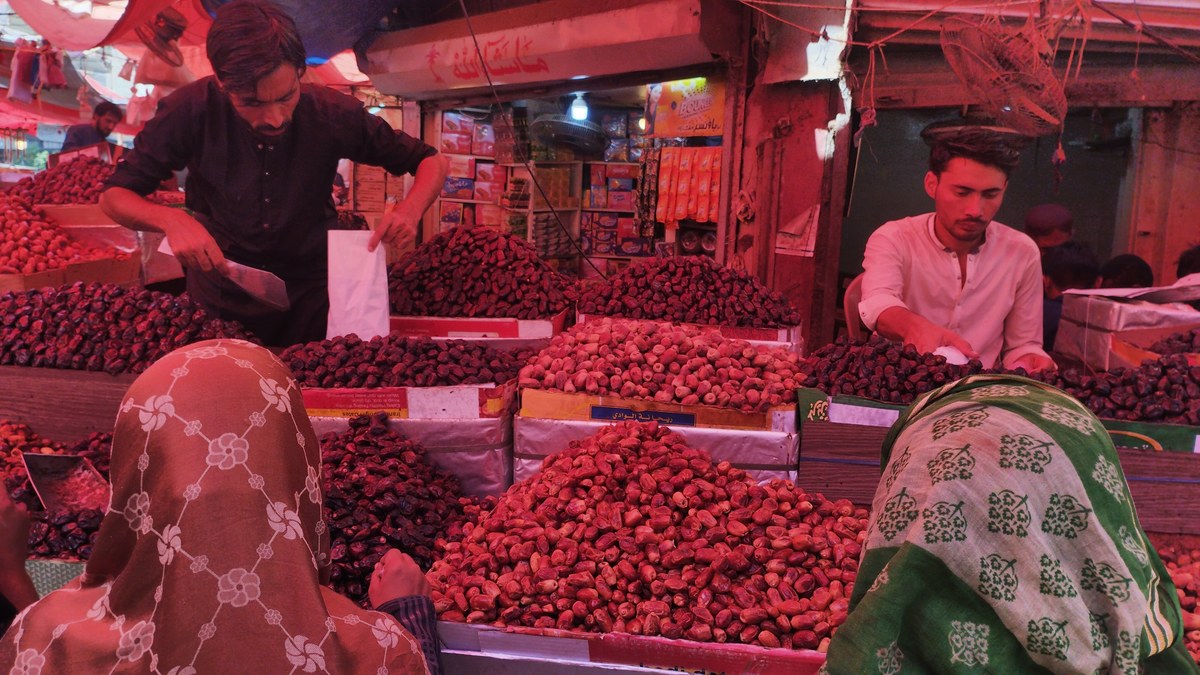KARACHI: Buyers were showing up in huge numbers to Pakistan’s largest and oldest dates market in Karachi ahead of the holy month of Ramadan, traders said, despite soaring prices and high tariffs imposed by neighboring Iran.
Nestled in the historic quarters of Lyari Town, the century-old Khajjoor Market, quiet through the year, becomes a hive of activity as Ramadan approaches. More than 90 percent of the date business in Muslim-majority Pakistan depends on Ramadan, with dates considered the most essential part of iftar, the first meal at sunset after fasting through the day.
But this year, prices have been unusually high, mainly due to rains in Pakistan’s southwest that affected crops, currency devaluation and the imposition of high duties by Iran, a key supplier of dates to Pakistan, according to importers and dealers.
“This year, the dates prices are higher because of the rain-related destruction in Balochistan and freight charges have increased and at [Pakistan-Iran] border, GD [Goods Declaration] that is being converted in dollar, due to which its rates have increased,” Hanif Baloch, an importer and dealer, told Arab News.
“The third reason is that Iran has increased tax to 200 percent, that is why its cost has increased,” Baloch added, saying the cost of dates had gone up by 10 percent compared to last year.
“CUT DOWN BUYING”
Pakistan is a major producer of dates, with annual production estimated to be around 500,000 metric tons. The main areas for date cultivation in Pakistan are Khairpur, Sukkur, and Nawabshah districts in the southern Sindh provinces, and Turbat, Panjgur, and Kech in the southwestern Balochistan province.

Women buy dates ahead of holy month of Ramadan in Karachi, Pakistan, on March 11, 2024. (AN photo)
But date producing parts of Sindh are still reeling from the effects of devastating floods in 2022, which destroyed large tracts of infrastructure and prime farmland and crops.
“That is why goods [dates] which were available for Rs20,000 have gone up to Rs26,000 per 40 kilograms,” Muhammad Sabir, chairman of the Khajjoor Market Association, told Arab News.
Traders said the closure of the Pakistan-Iran border due to recent torrential rains in Pakistan’s southwest had also caused a shortage of dates in the market and driven up prices.
“If the border is opened, it is hoped that yellow dates, Zahidi and Rabai [varieties that are widely grown in Iran] will start coming into Pakistan,” Sabir said.
Some popular date varieties and their per kilogram prices are Mazafati (Rs500-Rs600), Rabai (Rs600), Bayaram (Rs700), Zahidi (Rs400), and Basra (Rs350), according to the dealers.
Buyers at the market said they had cut down on buying to adjust to the price hikes.
“We have cut down our buying,” Nasreen Khatoon, a housewife, told Arab News. “We will wait for the market to cool down to buy more dates after the middle of Ramadan.”
Niaz Khan, a cloth merchant, said rates had increased significantly as compared to last year.
“I have checked the market and the rates have gone up,” Khan said. “The reasons are obvious,” he added, referring to the state of Pakistan’s economy.
Pakistan, a nation of over 241 million people, is reeling from the impact of inflation that hit a historic high of 38 percent in May last year, but eased to 23.1 percent in February this year, still on the higher side mainly due to the high costs of energy and food.






















